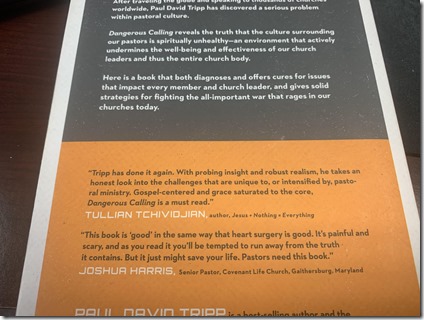 “We don’t need CRT to help us deal with racism. The Bible is entirely sufficient.”
“We don’t need CRT to help us deal with racism. The Bible is entirely sufficient.”
I hear similar statements with increasing frequency. You can replace CRT and racism with other issues as well. There is a growing movement which believes you don’t need X because the Bible is sufficient. I would argue that this is not a faithful development of the doctrine of scriptural sufficiency. Today, I will show you a consequence of this misstep.
It is not my intention to defend CRT. So, if you’ve come here to tell me that it’s a godless ideology that has no place within Christianity, take your argument elsewhere. I’m not arguing FOR that particular solution to racial issues. My intention today is to argue against a view of sufficiency which would de facto reject a secular ideology as a help in addressing something such as racism.
What is meant by sufficiency?
Historically the sufficiency of Scripture means that the Scriptures give us everything we need to know to please God. And they are sufficient to interpret themselves (you don’t need an outside magisterium to give you the interpretation). We have in the Scriptures what we need to have a relationship with Christ. I’ve appreciated Piper’s summary:
In other words, the Scriptures are sufficient in the sense that they are the only (“once for all”) inspired and (therefore) inerrant words of God that we need, in order to know the way of salvation (“make you wise unto salvation”) and the way of obedience (“equipped for every good work”). The sufficiency of Scripture does not mean that the Scripture is all we need to live obediently. (here)
But I think in recent years that doctrine of sufficiency has widened a bit further than the Scriptures themselves would speak. It seems to me that in our day it has come to mean that the Bible is the best at everything and therefore it is the only thing you need. You don’t need other sources. And it’s often taken a step further—that to use other sources is an insult to the sufficiency of Scripture*.
So when it comes to issues of racism someone holding this more recent view of sufficiency would say that we do not need a secular ideology, the Bible is all we need to solve the issues surrounding racism.
But what is meant by that?
Do we mean that the Bible gives us everything we need to know how to please God on issues of race? I’d wholeheartedly agree. Do we mean that the Bible is all that is needed for the Spirit to define and convict the world in regards to righteousness in areas of racism? Sure. But it seems to me that many mean something more by this—the Bible is all that is needed to solve the issues regarding racism.
God has given us the Scriptures. He has equipped us with what is needed to end racism. That sounds really good. But I want to give that a bit of a test run using Luke 9.
The Consequence of Luke 9
In Luke 9:1-2 Jesus empowered the disciples to cast out demons and to heal sickness. Demonic induced epilepsy certainly falls under this category of stuff they should have been able to fix. But when they encountered a boy who was “shattered” by this very ailment the disciples were powerless.
They should have been able to fix it, but they did not because of their faithlessness. They had brokenness at their feet and they were impotent. That’s why I put Raphael’s Transfiguration as the photo on this article. It’s a perfect picture of what’s taking place in this passage. Powerful Christ. Empowered, but impotent Church.
I think it is the church who actually gets the rebuke of Jesus when he said, “O faithless and twisted generation, how long am I to be with you and bear with you?” Luke has their failure on full display in this chapter. They are busy with self-promotion, self-preservation, and a self-focus that keeps them ultimately faithless and powerless when they ought to be healing brokenness.
I’m sharing this because if you want to claim Luke 9:1-2 empowerment (God has given us everything we need to solve issues of racism) then we have to deal with the consequence of our impotence. If we do have everything we need to solve this issue, then why is there still racism?
Do you blame ungodly systems for the continuance of racism? Is it that sinful hearts are still harboring racist thoughts? Is it that the church has been too busy with self-promotion to actually be about working towards racial reconciliation?
I suppose one option, and one which I think we’ll see people lean towards more in the coming days, is to deny that racism is still a thing. If you can’t solve it perhaps you can deny it and then pretend as if your solution actually worked.
All I’m attempting to say here is this, if you truly believe that the Bible is all you need to “deal with racism”, then you’d better get to work because there is quite a bit of brokenness at your feet.
There is another option…
The Inconsolable Things
I would argue that when it comes to some of these issues we actually are not pinned into the corner by Luke 9. I do not believe the sufficiency of Scripture means that we have everything we need to end racism. We have everything we need to individually please God in how we handle issues of race. But I would leave redemption in this areas to the ultimate restoration we are going to see from Christ. The Scriptures are sufficient to tell us that these things will ultimately be fully and finally healed in Christ.
I think the words of Zack Eswine are helpful here:
But the presence of things we cannot control or immediately fix reminds us that though the Bible is God’s revelation, it in itself is not his magic remedy. It lights our path by his Spirit, but it cannot always shield us from what he shows us there. Only the Christ that the Bible verses reveal can do this. (Eswine, 93)
Eswine goes on to talk about “fix-it-alls” who believe with Bible in hand that they are going to be able to fix all the problems. The result is often frustration and anger. Typically a “fix-it-all” will lean into things like fear and intimidation when their simple solutions aren’t working.
“Fix-it-alls begin to think something like this: This situation or person couldn’t possibly be what it appears to be. We have quoted the Bible and made our arguments. Things should be fixed by now. There must be some hidden mischief here. We need to speak some more, but this time, louder and more accusatory. (Eswine, 93-94)
Eswine points out that there are some things which are “inconsolable”. We can’t ultimately fix these things. Only Christ can….and will.
Conclusion
One could think that my conclusion is that we simply must deal with the ever-present reality of things like racism. I suppose there is some sense in which it, like every other sin, will be present in human hearts and human society until Christ does make everything right. But that is no excuse for inaction. And it’s also why in the here and now we use whatever means God gives us to provide some relief. Yes, ultimate healing will always come through Christ. But he graciously gives temporary relief—and even at times by those who “aren’t one of us”.
—
*I’ve interacted in the past with Heath Lambert’s chapter on the sufficiency of Scripture in counseling. If you combine his definitions of this doctrine then you’d have a practical definition similar to this: “the Bible tells us “everything we need to know from God about any topic” to provide “answers, solutions, and help.” Lambert is talking about counseling—but I don’t believe it’d be a stretch to extend this definition to an issue such as racism.
Photo source: here



